Suwon sets example in policies against COVID-19
Suwon leads with preemptive measures to fight coronavirus, while providing citizen-centered policies in a range of fields
By Gha Hee sunPublished : Feb. 17, 2021 - 18:19
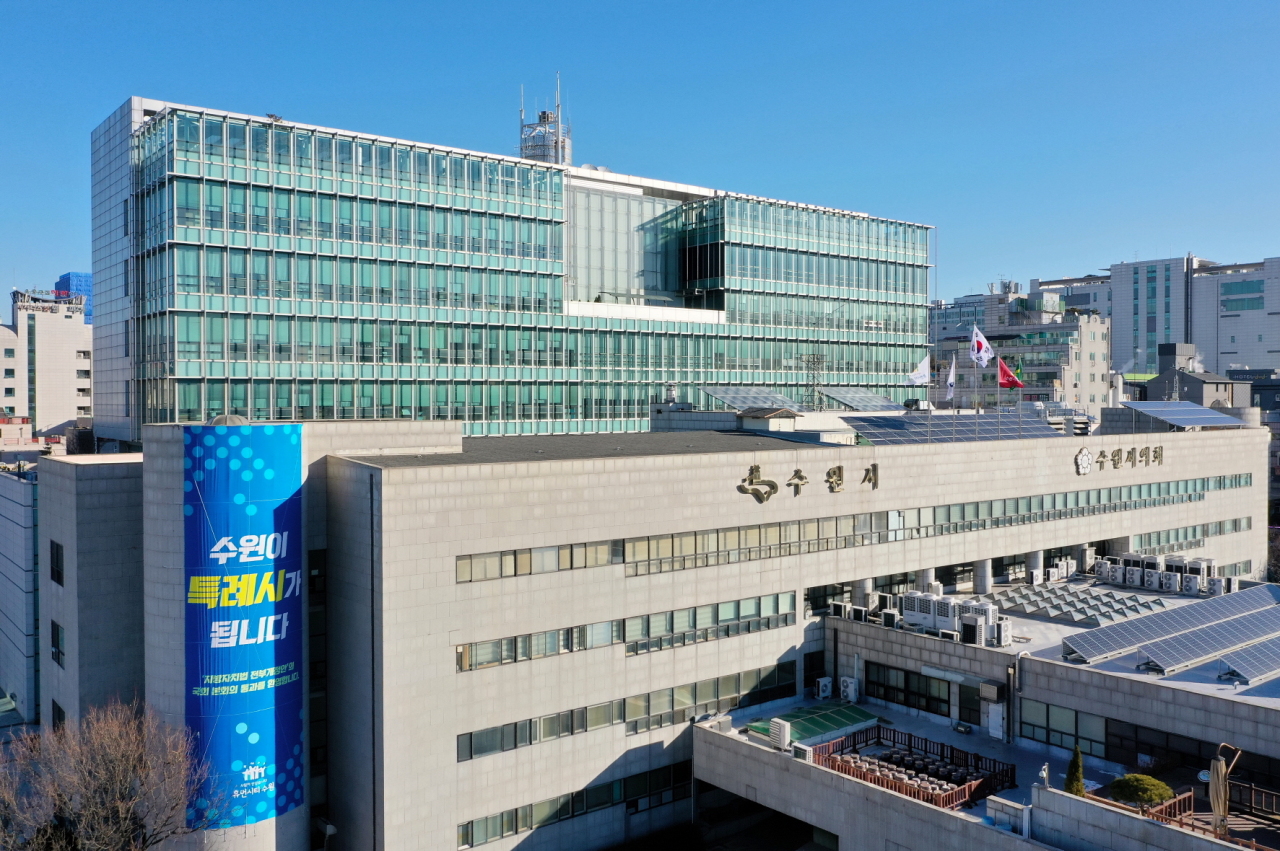
The population of Suwon City is 1.23 million, the largest among Gyeonggi Province’s 31 cities and counties, but its number of confirmed COVID-19 cases per 100,000 people is third from last.
The achievement was thanks to the dedication of citizens, health center employees, public officials and medical workers, who followed the quarantine rules despite the inconvenience and economic losses.
Suwon City took rapid countermeasures whenever there was an outbreak of the new coronavirus. In what some view as a positive overreaction, the city actively took part in quarantine policies, setting a prime example of K-quarantine.
Judging that it is difficult to block family from spreading the virus through just self-isolation, the local government began running temporary facilities to accommodate confirmed patients in February 2020, marking the first such case in Korea.
Last March, when the number of overseas patients began to surge, the city introduced the nation’s first system to manage overseas arrivals to prevent further transmission while traveling home from the airport. The city also enforced a temporary testing facility for symptom-free arrivals to stay until test results arrive as well as accommodation services that allow families to use hotels at low prices while overseas patients stay in quarantine.
With treatment facilities becoming scarce due to the third wave of the pandemic, the city operated temporary centers for treatment and self-quarantine until patients with mild symptoms could get access to hospital beds.
Also in February last year, the National Assembly passed a partial revision of the act on prevention and management of infectious diseases, authorizing contact tracers. The revision was based on a policy proposal by Mayor Yeom Tae-young, who had pushed for the measure since the MERS outbreak in 2015.
“The best way to prevent COVID-19 outbreak is through prevention,” Yeom said.
The achievement was thanks to the dedication of citizens, health center employees, public officials and medical workers, who followed the quarantine rules despite the inconvenience and economic losses.
Suwon City took rapid countermeasures whenever there was an outbreak of the new coronavirus. In what some view as a positive overreaction, the city actively took part in quarantine policies, setting a prime example of K-quarantine.
Judging that it is difficult to block family from spreading the virus through just self-isolation, the local government began running temporary facilities to accommodate confirmed patients in February 2020, marking the first such case in Korea.
Last March, when the number of overseas patients began to surge, the city introduced the nation’s first system to manage overseas arrivals to prevent further transmission while traveling home from the airport. The city also enforced a temporary testing facility for symptom-free arrivals to stay until test results arrive as well as accommodation services that allow families to use hotels at low prices while overseas patients stay in quarantine.
With treatment facilities becoming scarce due to the third wave of the pandemic, the city operated temporary centers for treatment and self-quarantine until patients with mild symptoms could get access to hospital beds.
Also in February last year, the National Assembly passed a partial revision of the act on prevention and management of infectious diseases, authorizing contact tracers. The revision was based on a policy proposal by Mayor Yeom Tae-young, who had pushed for the measure since the MERS outbreak in 2015.
“The best way to prevent COVID-19 outbreak is through prevention,” Yeom said.
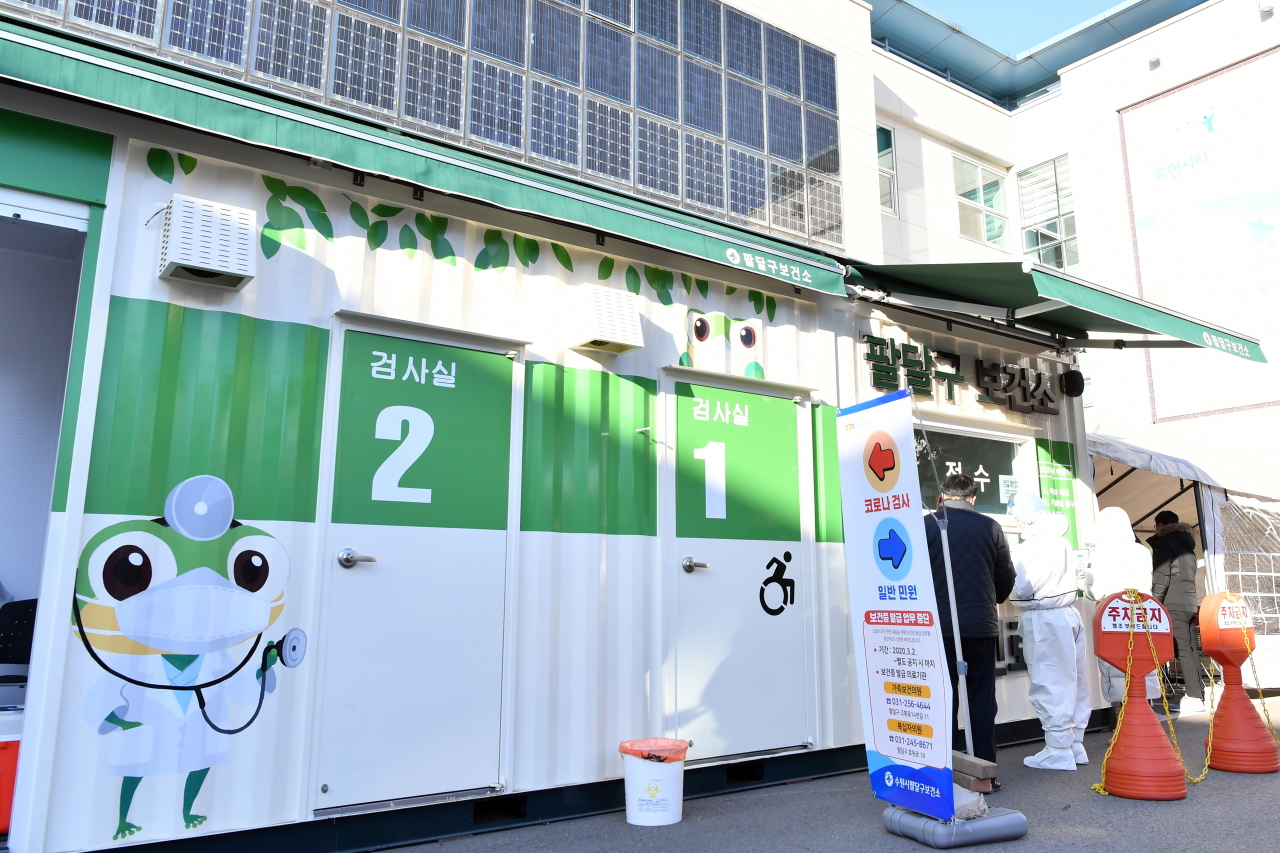
In January 2021, as a measure to prevent group infections from asymptomatic cases, he completed a full inspection on citizens who are prone to face-to-face contact, including workers from Delta Flex, day care centers, visiting caregivers, public transportation workers and residents of multi-family houses.
Moreover, mass inspection was carried out through rapid antigen testing and daily prevention methods were strengthened in public health and medical sectors. A health management department was established in Jangan-gu Health Center and a response team was established for a faster, more efficient management of the virus.
With vaccinations on the way starting this February, Suwon City will also ensure a fast and safe vaccination system.
In addition to the quarantine measures, the city also pushes for policies for the safety of its citizens.
Moreover, mass inspection was carried out through rapid antigen testing and daily prevention methods were strengthened in public health and medical sectors. A health management department was established in Jangan-gu Health Center and a response team was established for a faster, more efficient management of the virus.
With vaccinations on the way starting this February, Suwon City will also ensure a fast and safe vaccination system.
In addition to the quarantine measures, the city also pushes for policies for the safety of its citizens.
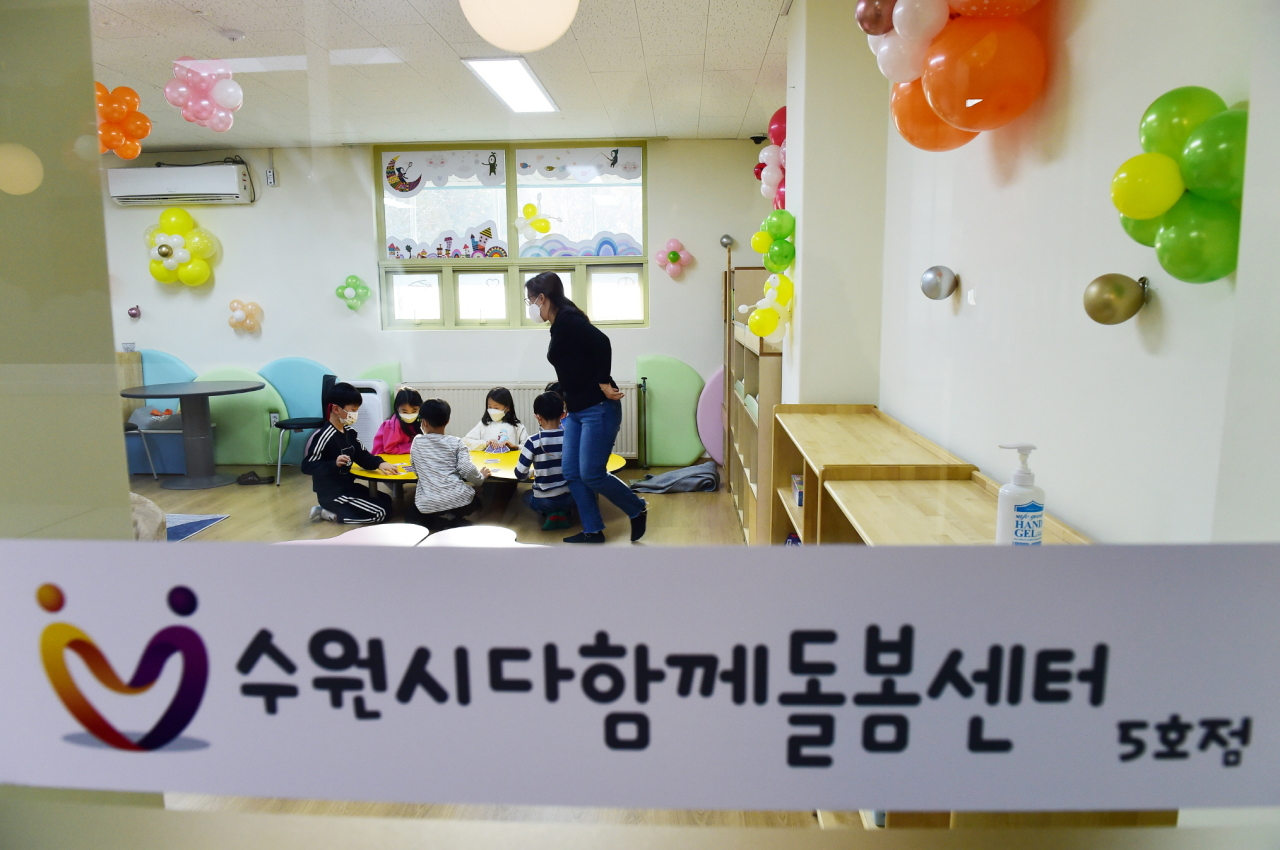
First, the city unveiled a blueprint for a safe city. As concerns for child abuse grow, child protection system was further strengthened. Starting from 2016, Suwon City formed the Suwon Child Protection Agency and enacted the ordinance on prevention and protection of child abuse. December of the same year, Children’s Protection Agency was formed as a foundation of child abuse.
Last December, the city enacted a subcommittee on child welfare deliberation, involving city officials, police, doctors, education support offices and child protection agencies.
The city is also continuing to make efforts to support children in need. Some children, including those who are not vaccinated, took long absence from kindergarten or daycare or have unclear addresses. They will be checked out in 44 districts and if suspected child abuse cases are found, immediate protection measures will be taken together with the Suwon Child Protection Agency and the police.
The long-cherished ambition of constructing a new police station in Paldal-gu is finally moving forward. Building work will begin this June and will be completed next December. It will be constructed on a 15,052-square-meter site near Motgol intersection with a basement floor and three floors above ground.
Last December, the city enacted a subcommittee on child welfare deliberation, involving city officials, police, doctors, education support offices and child protection agencies.
The city is also continuing to make efforts to support children in need. Some children, including those who are not vaccinated, took long absence from kindergarten or daycare or have unclear addresses. They will be checked out in 44 districts and if suspected child abuse cases are found, immediate protection measures will be taken together with the Suwon Child Protection Agency and the police.
The long-cherished ambition of constructing a new police station in Paldal-gu is finally moving forward. Building work will begin this June and will be completed next December. It will be constructed on a 15,052-square-meter site near Motgol intersection with a basement floor and three floors above ground.
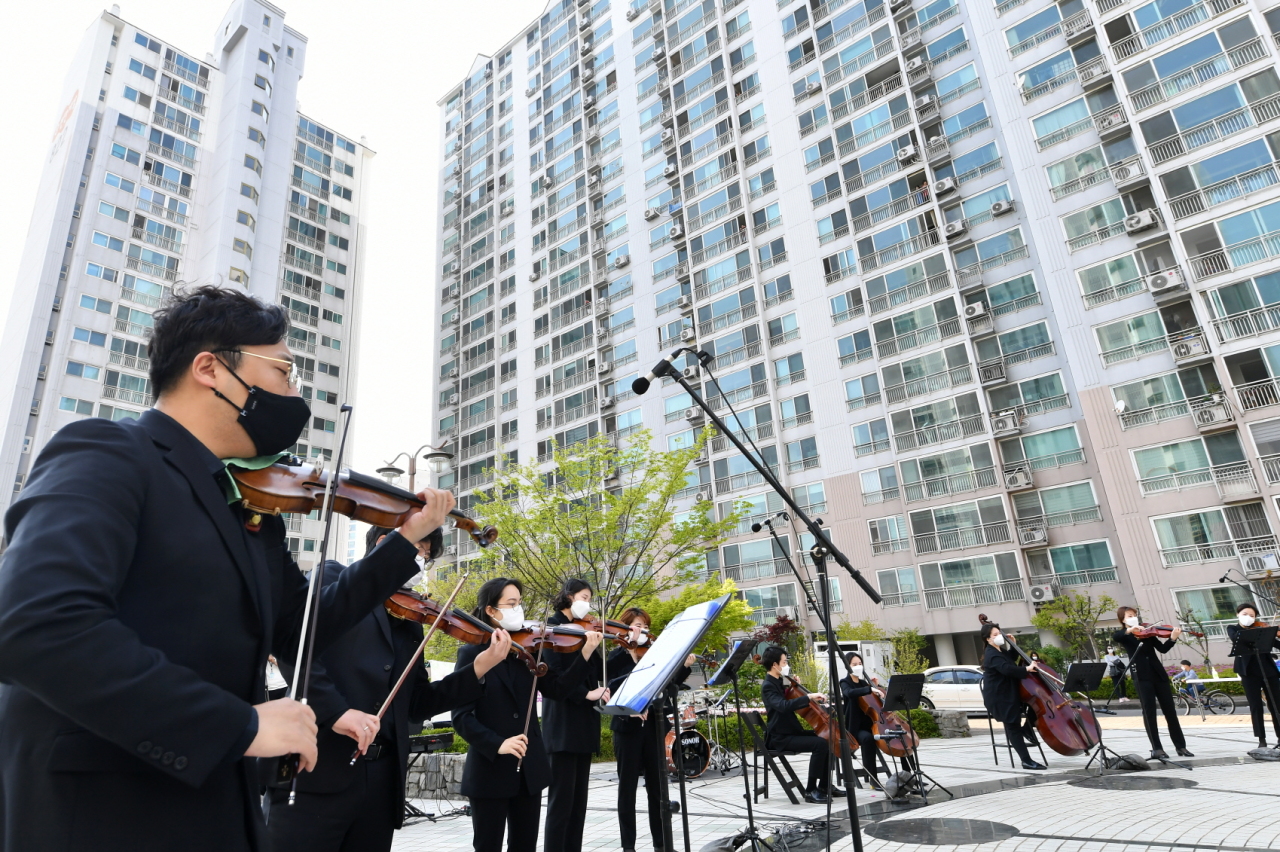
Also, sidewalks, green areas and small parks will be built in public open areas for a cleaner, safer living in Suwon City.
Using the infrastructure of the Urban Safety Integration Center, Suwon City is fostering a “Smart City System.” With 12,304 security cameras in operation, the city boasts the highest number out of all local governments nationwide. As a comprehensive safety measure, the city has been increasing the number of security cameras since 2012.
Personnel working at the Urban Safety Integration Center watch 24 hours a day for the safety of Suwon citizens. If a crime is suspected, security camera footage can be provided after notifying police to prevent further harm.
In an effort to create a safe city without any blind spots, the city will install more cameras in 46 blind spots and improve the performance of 79 more.
Suwon also plans to develop a safe city through an emergency vehicle priority signaling system. The city will expand the system from two vehicles to four vehicles this year.
The system, which is expected to help secure crucial time in emergency situations, tracks the location of emergency vehicles with GPS. When a vehicle approaches an intersection, the signal will automatically turn green. With this, it would take less then 10 minutes to reach Ajou University Hospital and St. Vincent Hospital.
Suwon is also handing out financial support to pandemic-hit citizens. “There are too many struggling small merchants, mom-and-pop shops, small and medium-sized merchants that make my heart heavy,” Yeom said.
Businesses that were restricted or suspended due to social distancing rules faced even more damage, especially with the start of Level 2.5 rules.
“Although restrictions are inevitable to prevent further spread of the virus, it is not only too harsh but unfair to put the burden on the business owners and employees,” he added.
The past three rounds of relief funds were not enough to make up for business losses. Suwon will put in every effort to ensure compensation for those who were damaged by the quarantine measures.
Suwon will also carry out support programs for small business owners. The city is to contribute 900 million won ($816,000) to the Special Guarantee of Small Businesses project and will provide special fees to small businesses that received special guarantees. Special guarantees will help small businesses with that have poor credit ratings or lack security to borrow loans through the Gyeonggi Credit Guarantee Foundation.
The city will implement projects to help support businesses including customized consulting for small business owners, as well as those which will help improve the business environment.
Local tax benefits will be also provided to those who participate in the Good Landlord Campaign by offering reimbursements of 2020 and 2021 property taxes. The deduction rate is calculated by how much rent was reduced by and how long for. Landlords can receive up to 40 percent reimbursements of property tax if they decrease rent by 10 percent.
In Suwon, more than 1,230 shops are believed to have received rent discounts in the first half of last year.
Suwon Pay incentives will be set at 10 percent this year. If one deposits 100,000 won, an additional 10,000 won will be added as a bonus. Suwon will promote and improve its functions, including a mobile app card for convenience, and plans to encourage citizens to use Suwon Pay for purchases at small businesses.
Suwon City conducted a survey from September to October last year on the impact of prolonged COVID-19 outbreak. Among 1,247 registered manufacturing companies surveyed, 71.3 percent responded that their business conditions had worsened.
To help such businesses, Suwon will provide 1.49 billion won through four projects, focusing on small to medium-sized business. The support measures include a small to medium-sized enterprise promotion fund.
The city will also push for projects such as customized consulting, intellectual property support and promotion of startups to further promote the growth of small to medium-sized enterprises.
With small to medium-sized export companies struggling due to travel restrictions and absence of export fairs, Suwon will produce a promotion film of startups and their products. For additional support, the city will also provide “door-to-door export shipping,” to simplify the export process.
The city also plans to beef up socially distanced export marketing support, while aiming to create 36,000 jobs in the local area this year.
Last year, Suwon became a role model city and implemented a set of innovative policies that suited its special city status.
For instance, the city’s traffic became more efficient with the opening of Suin Line and Suwonbukbusunhwan-ro. The city’s administrative efforts, such as the adjustment of administrative districts and the completion of the second phase of the agricultural and fishery wholesale market, to make the lives of citizens more convenient, paid off one after another.
With the completion of the third stage of the Suin Line double-track railway in September 2020, Goseok Station and Omokcheon Station were officially opened.
The entire Suin Line was finally reconnected after 25 years, allowing residents in western Suwon to use the subway to reach nearby places, including Ansan, Yongin, Seongnam, Seoul and Incheon. In particular, Suwon decided to build the Suwon section of the Suin Line underground and set up a space for residents on the ground level, creating the foundation for future development of the Seosuwon area.
Suwonbukbusunhwan-ro, which connects Imok-dong, Jangan-gu to Iui-dong, Yeongtong-gu was finally opened on Sept. 21.
As Suwon’s first private investment project, the road allows travel from North Suwon to Gwanggyo, Yongin and Gwangju without passing through the city center, making traffic easier for the whole of Suwon.
Traffic around the administrative town of West Suwon, which had been experiencing frequent congestion, was also improved. With a 940-meter elevated highway at the intersection opening in last August, the section connecting Homaesil IC and Suwon Station has been smoothed out and the convenience of citizens traveling to and from the Homaesil district has also increased.
Suwon Station is considered a major achievement in establishing Suwon as the largest base station in southern Gyeonggi Province. Suwon Station is currently at the center of the Gyeongbu Line, National Railroad Line 1, Suin and Bundang Line.
In addition, with projects like the GTX-C line, which will connect Deokjeong Station, as well as the KTX direct project, Suwon City’s role as a transportation hub in southern Gyeonggi will inevitably expand.
Suwon’s plans for Suwon Station East Transfer Center has been selected as the best pilot project for the Seoul Metropolitan Rapid Transit Railway Station Transfer Center’ sponsored by the Ministry of Land, Infrastructure and Transport Metropolitan Transport Committee.
The transfer center plans to connect the traffic island in the center of Suwon Station Square to Rodeo Street to create a pedestrian axis that connects Suwon Station, Suwon Station Square and Rodeo Street as well as to relocate the bus stop scattered in the eastern square right in front of the station. With this, transfer time is expected to be reduced to less than three minutes, congestion at nearby bus stops will be partially alleviated and the center will be able to be reborn as a human-centered square.
The second phase of the project to modernize Suwon agricultural and fishery wholesale market was also completed without hardships.
Using the infrastructure of the Urban Safety Integration Center, Suwon City is fostering a “Smart City System.” With 12,304 security cameras in operation, the city boasts the highest number out of all local governments nationwide. As a comprehensive safety measure, the city has been increasing the number of security cameras since 2012.
Personnel working at the Urban Safety Integration Center watch 24 hours a day for the safety of Suwon citizens. If a crime is suspected, security camera footage can be provided after notifying police to prevent further harm.
In an effort to create a safe city without any blind spots, the city will install more cameras in 46 blind spots and improve the performance of 79 more.
Suwon also plans to develop a safe city through an emergency vehicle priority signaling system. The city will expand the system from two vehicles to four vehicles this year.
The system, which is expected to help secure crucial time in emergency situations, tracks the location of emergency vehicles with GPS. When a vehicle approaches an intersection, the signal will automatically turn green. With this, it would take less then 10 minutes to reach Ajou University Hospital and St. Vincent Hospital.
Suwon is also handing out financial support to pandemic-hit citizens. “There are too many struggling small merchants, mom-and-pop shops, small and medium-sized merchants that make my heart heavy,” Yeom said.
Businesses that were restricted or suspended due to social distancing rules faced even more damage, especially with the start of Level 2.5 rules.
“Although restrictions are inevitable to prevent further spread of the virus, it is not only too harsh but unfair to put the burden on the business owners and employees,” he added.
The past three rounds of relief funds were not enough to make up for business losses. Suwon will put in every effort to ensure compensation for those who were damaged by the quarantine measures.
Suwon will also carry out support programs for small business owners. The city is to contribute 900 million won ($816,000) to the Special Guarantee of Small Businesses project and will provide special fees to small businesses that received special guarantees. Special guarantees will help small businesses with that have poor credit ratings or lack security to borrow loans through the Gyeonggi Credit Guarantee Foundation.
The city will implement projects to help support businesses including customized consulting for small business owners, as well as those which will help improve the business environment.
Local tax benefits will be also provided to those who participate in the Good Landlord Campaign by offering reimbursements of 2020 and 2021 property taxes. The deduction rate is calculated by how much rent was reduced by and how long for. Landlords can receive up to 40 percent reimbursements of property tax if they decrease rent by 10 percent.
In Suwon, more than 1,230 shops are believed to have received rent discounts in the first half of last year.
Suwon Pay incentives will be set at 10 percent this year. If one deposits 100,000 won, an additional 10,000 won will be added as a bonus. Suwon will promote and improve its functions, including a mobile app card for convenience, and plans to encourage citizens to use Suwon Pay for purchases at small businesses.
Suwon City conducted a survey from September to October last year on the impact of prolonged COVID-19 outbreak. Among 1,247 registered manufacturing companies surveyed, 71.3 percent responded that their business conditions had worsened.
To help such businesses, Suwon will provide 1.49 billion won through four projects, focusing on small to medium-sized business. The support measures include a small to medium-sized enterprise promotion fund.
The city will also push for projects such as customized consulting, intellectual property support and promotion of startups to further promote the growth of small to medium-sized enterprises.
With small to medium-sized export companies struggling due to travel restrictions and absence of export fairs, Suwon will produce a promotion film of startups and their products. For additional support, the city will also provide “door-to-door export shipping,” to simplify the export process.
The city also plans to beef up socially distanced export marketing support, while aiming to create 36,000 jobs in the local area this year.
Last year, Suwon became a role model city and implemented a set of innovative policies that suited its special city status.
For instance, the city’s traffic became more efficient with the opening of Suin Line and Suwonbukbusunhwan-ro. The city’s administrative efforts, such as the adjustment of administrative districts and the completion of the second phase of the agricultural and fishery wholesale market, to make the lives of citizens more convenient, paid off one after another.
With the completion of the third stage of the Suin Line double-track railway in September 2020, Goseok Station and Omokcheon Station were officially opened.
The entire Suin Line was finally reconnected after 25 years, allowing residents in western Suwon to use the subway to reach nearby places, including Ansan, Yongin, Seongnam, Seoul and Incheon. In particular, Suwon decided to build the Suwon section of the Suin Line underground and set up a space for residents on the ground level, creating the foundation for future development of the Seosuwon area.
Suwonbukbusunhwan-ro, which connects Imok-dong, Jangan-gu to Iui-dong, Yeongtong-gu was finally opened on Sept. 21.
As Suwon’s first private investment project, the road allows travel from North Suwon to Gwanggyo, Yongin and Gwangju without passing through the city center, making traffic easier for the whole of Suwon.
Traffic around the administrative town of West Suwon, which had been experiencing frequent congestion, was also improved. With a 940-meter elevated highway at the intersection opening in last August, the section connecting Homaesil IC and Suwon Station has been smoothed out and the convenience of citizens traveling to and from the Homaesil district has also increased.
Suwon Station is considered a major achievement in establishing Suwon as the largest base station in southern Gyeonggi Province. Suwon Station is currently at the center of the Gyeongbu Line, National Railroad Line 1, Suin and Bundang Line.
In addition, with projects like the GTX-C line, which will connect Deokjeong Station, as well as the KTX direct project, Suwon City’s role as a transportation hub in southern Gyeonggi will inevitably expand.
Suwon’s plans for Suwon Station East Transfer Center has been selected as the best pilot project for the Seoul Metropolitan Rapid Transit Railway Station Transfer Center’ sponsored by the Ministry of Land, Infrastructure and Transport Metropolitan Transport Committee.
The transfer center plans to connect the traffic island in the center of Suwon Station Square to Rodeo Street to create a pedestrian axis that connects Suwon Station, Suwon Station Square and Rodeo Street as well as to relocate the bus stop scattered in the eastern square right in front of the station. With this, transfer time is expected to be reduced to less than three minutes, congestion at nearby bus stops will be partially alleviated and the center will be able to be reborn as a human-centered square.
The second phase of the project to modernize Suwon agricultural and fishery wholesale market was also completed without hardships.
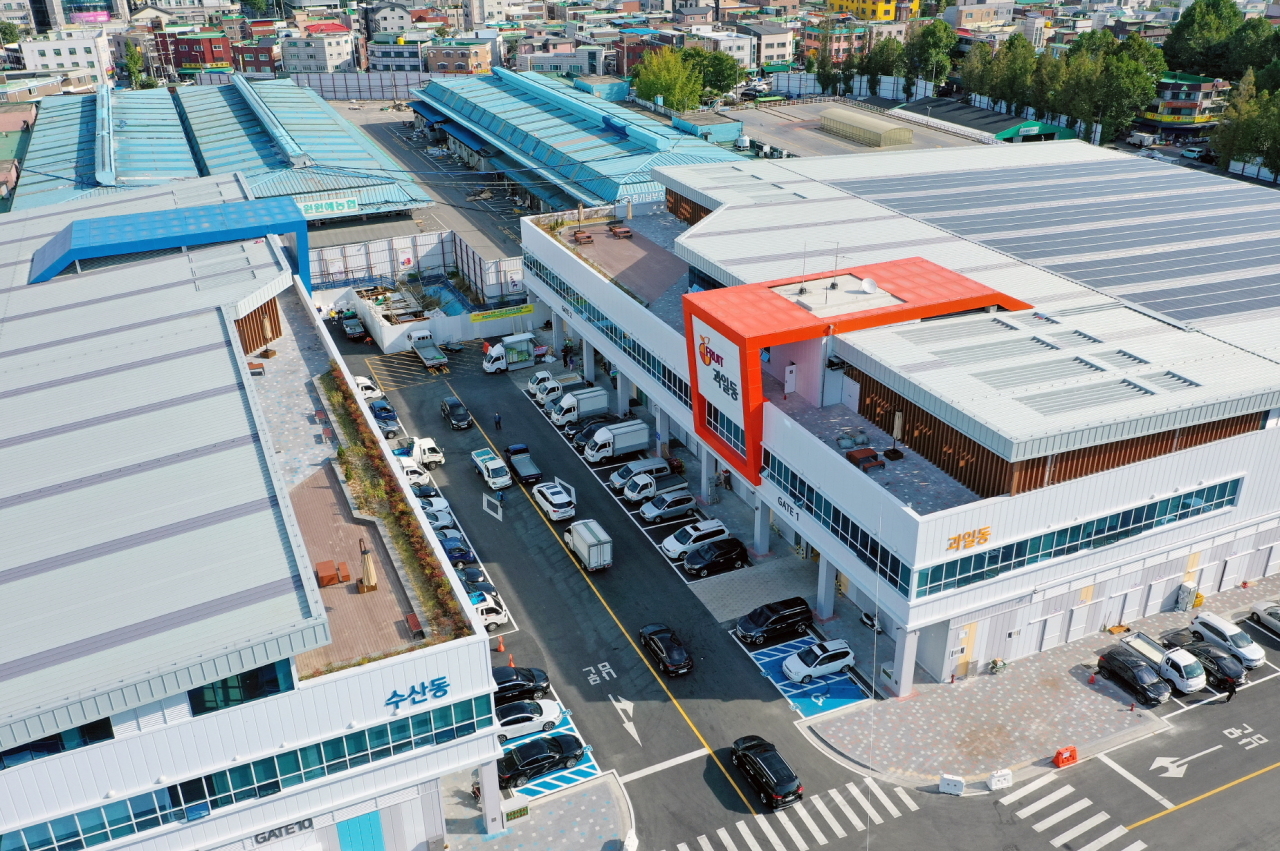
Suwon Agricultural and Fishery Products Wholesale Market, which opened in February 1993, began renovation through the Circular Redevelopment method due to severe aging of facilities.
While the merchants continued on with their business activities, Suwon City established a step by step redevelopment plan to restore business functions after improvement of facilities. The plan first arranged temporary stores in the vegetable department then newly constructed the fruit and fisheries department as the second stage.
In order to minimize users’ inconvenience, a total of 82 consultations were held over three years and requirements were collected for a communicative administration.
Fruit wholesalers who are a part of three wholesale corporations moved into the fruit department, which has 54 stores with a size of 22 square meters. Moreover, 60 stores from two wholesale corporations moved into the fisheries department. These stores have been operating since Aug. 31 of last year.
After the merchants enter the revamped vegetable department in the old fruit and fisheries building by the end of next year, the agricultural and fishery wholesale market is expected to become Suwon’s center market.
Suwon City made adjustments to the administrative district with Yongin City last year and further succeeded in adjusting the administrative district with Hwaseong City this year to preemptively facilitate the residents’ use of administrative services.
Suwon City had been discussing how to adjust the administrative boundaries with Hwaseong City since 2014 and was able to finally draw an agreement.
This is to prevent inconveniences from moving into the multi-family houses around the deformed boundary area of Suwon City.
By exchanging 190,000 square meters of land with Hwaseong City, 550 residents were ultimately incorporated into Suwon City on July 24, allowing them to enjoy closer living facilities. This is the result of the administration that prioritizes the convenience of its residents.
Suwon also won recognition for its efforts. The city continued to raise safety awareness through safety practices and education as well as civic participation campaigns for creating a community-involved safety culture. As a result, Suwon City won the grand prize in the Basic Local Government Sector (Presidential Award) of the 2020 Safety Culture Awards hosted by the Ministry of Public Administration and Security on Dec. 11 last year.
On Nov. 19, Suwon received the Presidential Award for the Emergency Vehicle Priority Signaling System at the 2020 Active Administrative Excellence Competition jointly held by the Ministry of Public Administration and Security and the Ministry of Personnel Management.
Suwon also won the Presidential Prize of the 22nd Sustainable Development Awards, hosted by the Ministry of Environment and organized by the Sustainable Development Council, for its food-sharing policy in which citizens can share refrigerators voluntarily.
In recognition of its efforts to introduce design management into the administrative system, it won the Presidential Award at the 2020 Korea Design Awards organized by the Ministry of Trade, Industry and Energy.
By Gha Hee-sun and Park Joung-kyu (lizka98@herladcorp.com) (fob140@heraldcorp.com)
While the merchants continued on with their business activities, Suwon City established a step by step redevelopment plan to restore business functions after improvement of facilities. The plan first arranged temporary stores in the vegetable department then newly constructed the fruit and fisheries department as the second stage.
In order to minimize users’ inconvenience, a total of 82 consultations were held over three years and requirements were collected for a communicative administration.
Fruit wholesalers who are a part of three wholesale corporations moved into the fruit department, which has 54 stores with a size of 22 square meters. Moreover, 60 stores from two wholesale corporations moved into the fisheries department. These stores have been operating since Aug. 31 of last year.
After the merchants enter the revamped vegetable department in the old fruit and fisheries building by the end of next year, the agricultural and fishery wholesale market is expected to become Suwon’s center market.
Suwon City made adjustments to the administrative district with Yongin City last year and further succeeded in adjusting the administrative district with Hwaseong City this year to preemptively facilitate the residents’ use of administrative services.
Suwon City had been discussing how to adjust the administrative boundaries with Hwaseong City since 2014 and was able to finally draw an agreement.
This is to prevent inconveniences from moving into the multi-family houses around the deformed boundary area of Suwon City.
By exchanging 190,000 square meters of land with Hwaseong City, 550 residents were ultimately incorporated into Suwon City on July 24, allowing them to enjoy closer living facilities. This is the result of the administration that prioritizes the convenience of its residents.
Suwon also won recognition for its efforts. The city continued to raise safety awareness through safety practices and education as well as civic participation campaigns for creating a community-involved safety culture. As a result, Suwon City won the grand prize in the Basic Local Government Sector (Presidential Award) of the 2020 Safety Culture Awards hosted by the Ministry of Public Administration and Security on Dec. 11 last year.
On Nov. 19, Suwon received the Presidential Award for the Emergency Vehicle Priority Signaling System at the 2020 Active Administrative Excellence Competition jointly held by the Ministry of Public Administration and Security and the Ministry of Personnel Management.
Suwon also won the Presidential Prize of the 22nd Sustainable Development Awards, hosted by the Ministry of Environment and organized by the Sustainable Development Council, for its food-sharing policy in which citizens can share refrigerators voluntarily.
In recognition of its efforts to introduce design management into the administrative system, it won the Presidential Award at the 2020 Korea Design Awards organized by the Ministry of Trade, Industry and Energy.
By Gha Hee-sun and Park Joung-kyu (lizka98@herladcorp.com) (fob140@heraldcorp.com)












![[Today’s K-pop] BTS pop-up event to come to Seoul](http://res.heraldm.com/phpwas/restmb_idxmake.php?idx=644&simg=/content/image/2024/04/17/20240417050734_0.jpg&u=)




![[KH Explains] Hyundai's full hybrid edge to pay off amid slow transition to pure EVs](http://res.heraldm.com/phpwas/restmb_idxmake.php?idx=652&simg=/content/image/2024/04/18/20240418050645_0.jpg&u=20240419100350)

